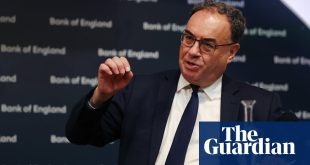Boris Johnson threw a mishmash of wishful economic thinking at the Conservative party conference wall last week and his advisers will spend this weekend hunkered down in No 10 hoping some of it will stick. Early signs are not good. Only hours after the prime minister stepped off the podium, the rightwing Adam Smith Institute thinktank called his rhetoric “bombastic but vacuous and economically illiterate”. It was typical of reaction throughout the business community.
According to Johnson-omics, Britain will emerge fitter, happier and more productive once the prime minister’s limits on foreign labour have forced domestic employers to ramp up wages. Never mind that academic research finds little correlation between immigration and average pay. More immediately, he is ignoring the factory owners who are slamming on the brakes in response to shortages of key components, and the building firms downing tools for lack of concrete and steel. And what of concerns that rising gas and food prices are likely to send inflation well above the 4%-4.5% peak expected by the Bank of England?
The babbling brook of words that tumbled from Johnson’s mouth obviously made sense to him and his aides in No 10. What is less clear is how and why it made sense to his next-door neighbour.
It falls to Rishi Sunak to explain how the efforts of ministers, civil servants and business owners themselves, have failed over six decades or more – decades characterised by Britain’s relative decline – to create the high-wage economy Johnson says is just around the corner.
The Sunak doctrine appears to rely on the same building blocks as Johnson-omics. Investment in skills training for the existing pool of labour, sponsored by the government, makes workers more productive. A more productive workforce leads to increased profits, allowing companies to afford higher wages and higher taxes. To complete the trick, there is also enough money left over to boost investment in new kit and to keep dividends flowing to shareholders.
In this new paradigm, only those who cannot work receive welfare. Everyone else will have a job that pays enough to live the good life. With the burden of welfare spending reduced, borrowing as a percentage of national income will fall.
In his conference speech, Johnson inevitably invoked the memory of one former leader to support his mission. “Margaret Thatcher would not have ignored this meteorite that has just crashed through the public finances,” he said. “She would have wagged her finger and said more borrowing now is just higher interest rates and even higher taxes later.”
Let’s set aside for a moment that big borrowing over the past 18 months has been accompanied by lower interest bills, and that there is every expectation that ultra-low interest rates will persist for many years. Focus instead on a parallel between Johnson and Thatcher that relates to the present day.
Thatcher came to power promising a new era of high wages and investment based on “sound money” and an end to inflation. Within months, her chancellor, Geoffrey Howe, said he needed to make the adjustment quickly. Referring to limiting public spending to bring down borrowing, Howe told parliament: “We shall continue to pursue those policies so long as it is necessary for them to prevail.”
By 1981, the euphoria surrounding Thatcher’s victory had evaporated and she was the most unpopular prime minister of the postwar era. Riots swept the UK.
Her tumbling poll ratings were tied to the enormous pain she inflicted on society while waiting for the monetarist theories of Milton Friedman to work their magic. Many historians agree it is unlikely she would have won the 1983 election without the boost of winning the Falklands war.
Economists who liken the UK’s current situation to the 1970s argue mostly, and wrongly, that today’s economy bears some resemblance to the economy back then. It doesn’t, on almost every level.
Politically though, Johnson has embarked on a similar road to the one mapped out by Thatcher – an almost Maoist long march to the sunny uplands. In Johnson’s case, a mix of central planning and laissez–faire policies is already struggling to put so much as a home-grown turkey on the Christmas table.
In his budget this month, Sunak may prove more supple than Howe. With Covid lingering and inflation-adjusted wages already stalled, he could and should reverse welfare cuts before they begin to bite. It is also too early in the recovery for planned rises in income tax, national insurance, council tax and corporation tax. If he resists, he may have riots of his own to contend with.
 Top Naija News: Nigerian News, Breaking News Nigeria and World News Top Naija News is a daily news publication in Nigeria, delivering the latest breaking news in Nigeria and around the world.
Top Naija News: Nigerian News, Breaking News Nigeria and World News Top Naija News is a daily news publication in Nigeria, delivering the latest breaking news in Nigeria and around the world.



